A winch can be a lifesaver when you need to move heavy objects. There are two main types of winches: hydraulic and electric.
Both have their pros and cons, so it can be hard to decide which one is right for you.
When deciding between a hydraulic or an electric winch, most people have different questions:
- “Which is better?
- Which one is cheaper?
- Which one is more powerful?
- Which one has the fastest pulling capacity?”
In this article, I will answer these questions by giving you an in-depth analysis of both winches.
So if you are in the market for a new winch, or if you are a new winch user and want to get the best winch for your money, read on.
What Is The Difference Between Hydraulic And Electric Winches?
A Hydraulic Winch is powered by a liquid, typically oil, while an electric winch is powered by electricity.
Hydraulic winches are generally more powerful than electric winches, but they also require a motor and pump to operate, which can add weight and complexity.
Electric winches are simpler and lighter, making them a better choice for smaller vehicles or applications where weight is a concern.
Both hydraulic and electric winches can be used for pulling, lifting, or dragging objects.
Comparison Of Specs Between Hydraulic And Electric Winch:
In this section, we will compare the specs of hydraulic and electric winches, so you can decide which one is right for you.
1- Size of Hydraulic and Electric Winch:
The hydraulic winch is typically larger than the electric winch.
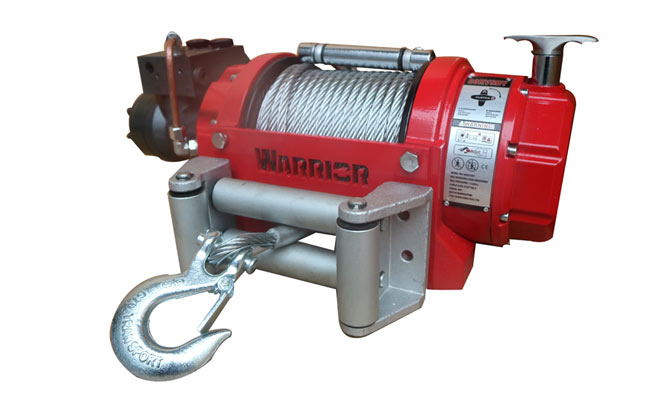
The hydraulic winch utilizes a motor to generate hydraulic power, then transmitted to the winch drum through a hydraulic hose.
On the other hand, the electric winch uses an electric motor to spin the winch drum.
2- Pulling Capacity of Hydraulic and Electric Winch:
The hydraulic and electric winch has different maximum pull capacities.
The hydraulic winch can pull up to 9,000 lbs, while the electric winch has a maximum pull capacity of 2,000 lbs.
This means the hydraulic winch can handle larger loads than the electric winch.
The hydraulic winch is powered by a gasoline engine, while a battery powers the electric winch.
3- Environmental impact of Hydraulic and Electric Winch:
The environmental impact of hydraulic and electric winches can vary depending on the type of winch and its function.
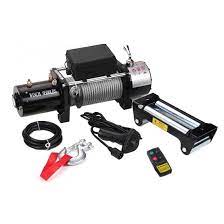
Generally, winches are either electric or hydraulic, and each has its benefits and drawbacks.
Electric winches are powered by a motor, which makes them quieter and more efficient than hydraulic winches.
However, electric winches are also more expensive and can be less potent than hydraulic winches
4- Maintainability of Hydraulic and Electric Winch:
The maintainability of hydraulic and electric winches is critical to safe and efficient operations.
Hydraulic winches are susceptible to contamination and must be regularly inspected and cleaned to ensure proper operation.
Electric winches, while requiring less maintenance, can experience problems with the electrical wiring if not properly installed or maintained.
5- Cost of Hydraulic and Electric Winch:
The cost of a hydraulic or electric winch varies depending on the make and model.
Generally, a hydraulic winch is more expensive than an electric one but also more powerful.
Some factors that may affect the price of a winch include the following:
● The rated capacity
● The speed of the winch
● The length of the power cable
● The type of motor (electric or hydraulic)
The cost of a winch also depends on the included features, such as a brake, clutch, or power take-off.
6- Noise Level of Hydraulic and Electric Winch:
You can measure hydraulic and electric winches’ noise level with a decibels (dB) sound level meter.
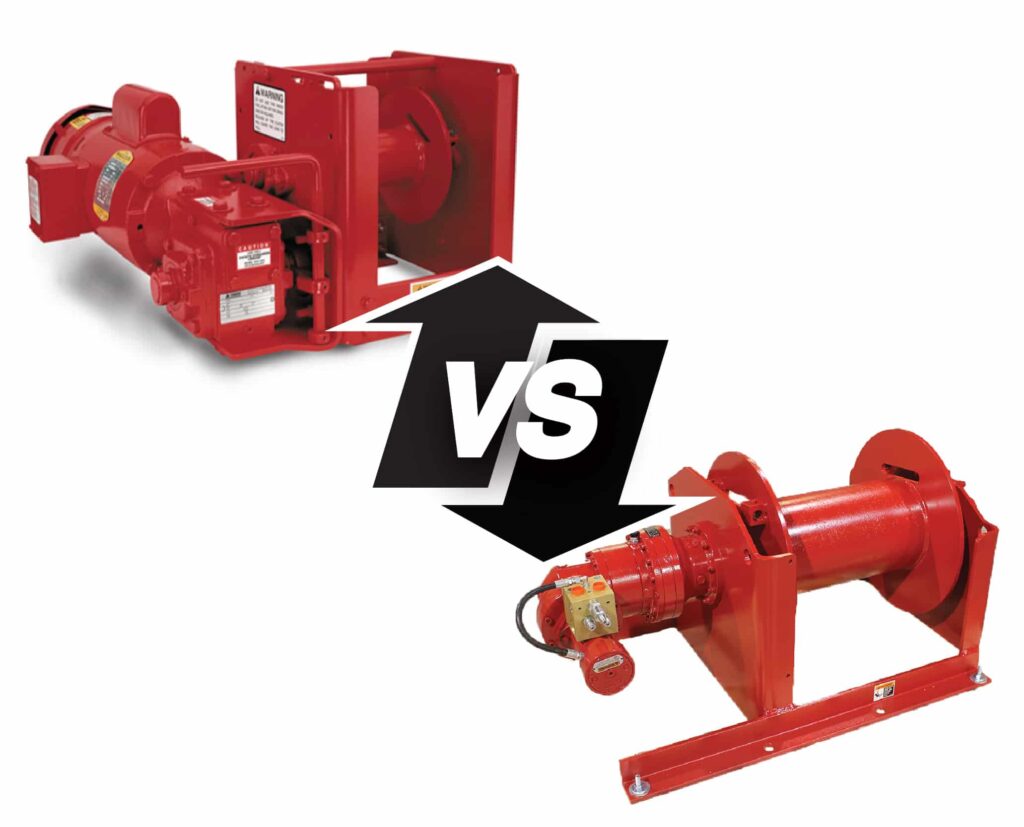
The higher the dB rating, the louder the winch.
Winches with a rating of less than 85 dB are generally considered low noise, while those with a rating of 95 dB or greater are high noise.
Winches with a rating of 105 dB or greater can cause hearing damage if misused.
The noise level of an electric winch is about 85 dB, while the hydraulic winch produces a noise level of about 95 dB.
Both winches are relatively loud and can cause hearing damage if operated for long periods without protection.
The electric winch is a bit quieter than the hydraulic winch.
7- Energy Consumption of Hydraulic and Electric Winch:
The energy consumption of hydraulic and electric winches can vary based on the type and size of the winch, as well as the application.
Electric winches are typically smaller and lighter than hydraulic winches, making them more portable.
8- Complexity of Hydraulic and Electric Winch:
The complexity of a hydraulic and electric winch system is determined by the number of subsystems integrated into the system and the number of components used in each subsystem.
The complexity also depends on the control algorithm used to activate and deactivate the subsystems.
In general, the more subsystems are integrated into a system, and the more components used in each subsystem, the more complex the system will be.
The Pros And Cons Of Using Hydraulic Winches:
A Few Of The Benefits Of Using Hydraulic Winches Are:
- You can tighten the rope quickly to get the vehicle moving.
- Winches can provide some added security and safety by helping to keep the vehicle from sliding backward while you’re working on it.
- If you plan to add more cables, they’re easy to cut, and the connections aren’t complicated.
- They are pretty light and portable.
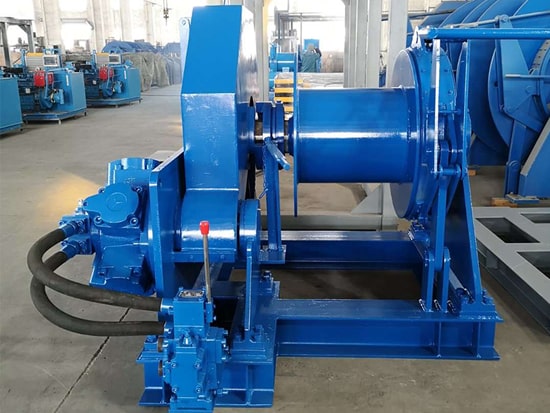
Here Are Some Of The Disadvantages Of Using Hydraulic Winches:
- When you use a hydraulic winch, you must have a pump or power source to operate the winch.
- You must be careful around sharp objects, as the winch can spin unexpectedly, causing you to trip and fall.
If You’re Thinking About Purchasing A Hydraulic Winch, There Are Two Options:
- You can buy an electric or gasoline-powered winch or a battery-powered winch that runs off a rechargeable battery.
- You can purchase a small hydraulic winch that operates off a standard garden hose or a big winch that can run off a larger water supply line.
The Of Pros And Cons Of Using Electric Winches:
Hydraulic Vs. Electric Winch: Which Winch Is Better?
You may see hydraulic or electric winches, but which one is better?Let’s take a look at each one.
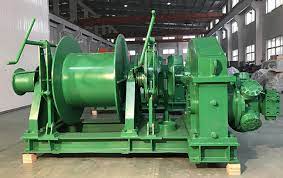
Hydraulic winches are made to pull heavy loads and are typically used in construction, farming, and industrial applications.
These winches come with a built-in pump, motor, and transmission.
Electric winches are quieter than hydraulic winches, so you might want to consider them if you have young children living in your home.
They also don’t require oil or gas and are cheaper to maintain.
Electric winches are usually easier to operate because you can use the remote control to wind slowly and release the winch rope.

Hydraulic winches, on the other hand, usually require the driver to pull on the rope manually.
So while a hydraulic winch might be better for pulling a heavier load, an electric winch is the better choice for simple applications.
Both winches also typically come with different power ranges.
An electric winch’s range is usually 20 to 50 feet, while a hydraulic winch can run 10 to 100 feet.
What Are Some Things To Consider When Choosing A Winch?
When choosing between hydraulic and electric winches, you need to consider the following factors:
1- Type Of Winch:
There are three types of winches: electric, hydraulic, and pneumatic.

Electric winches are the most common type and are powered by an electric motor.
Hydraulic winches use a hydraulic pump to generate power.
Pneumatic winches use compressed air to generate power.
2- Weight Capacity:
When choosing a winch, it is essential to consider the weight capacity.
The winch must be able to handle the weight of the object being lifted.
3- The Number Of Horsepowers:
The horsepower needed will depend on the weight of the object that needs to be pulled and the distance it needs to pull.
A winch with a higher horsepower rating can handle a heavier load and pull it further.
4- Type Of Motor:
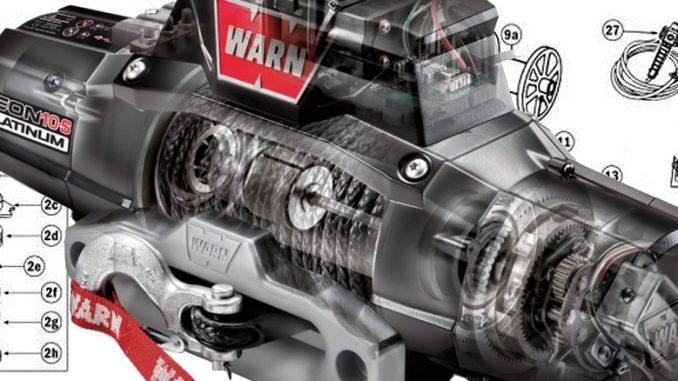
When choosing a winch for a motor vehicle, it is essential to consider the type of motor used.
There are three main types of motors: gasoline, diesel, and electric. Each type of motor has its own set of benefits and drawbacks.
For example, a 12-volt winch is best for use with a gasoline engine, while a 24-volt winch is best for use with an electric motor.
5- Power Source:
Some winches are powered by gasoline engines, while electric motors power others.
Gasoline-powered winches are more potent than electric-powered winches but tend to be heavier and louder.
Electric-powered winches are lighter and quieter than gasoline-powered winches, but they are not as powerful.
6- Price:
When looking for a winch, it is vital to consider the price.
There are many factors to consider when purchasing a winch, and the price is one of them.
Some cheaper winches may not have all the features you need, while more expensive winches may have more features than you need or want.
Finding the right balance between price and features is essential to finding the best winch for your needs.
7- Warranty:
Choosing a winch with a warranty that fits your needs is essential.
If you plan on using your winch frequently, then you may want to choose one with a lifetime warranty.
If you only use your winch occasionally, you may want to choose one with a limited warranty.
8- Maintenance:
Winches that require frequent greasing or oiling can be difficult to operate and may not be suited for heavy-duty applications.
Winches with sealed bearings require little or no maintenance and are ideal for use in harsh environments.
Choosing a winch that is appropriate for the level of maintenance you are willing or able to perform is essential.
Frequently Asked Questions:
1- How Much Does A Winch Cost?
The cost of a winch can vary depending on the type and size of the winch.
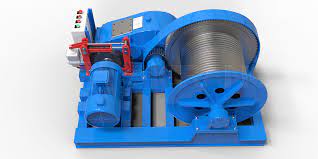
Generally, smaller winches are less expensive than larger winches.
Electric winches are typically less expensive than hydraulic or pneumatic winches.
Additionally, the features and options included on a winch can affect the final cost.
For instance, wireless remote control can add to the cost of a winch.
As part of the standard winch package, the winch can cost anywhere from $1,000-$6,000.
But you can easily find a high-quality winch for under $2,000.
2- What Maintenance Is Required To Keep The Winch Running Efficiently?
The winch needs to be lubricated regularly to keep it running efficiently.
The gears and other moving parts must be kept clean and free of debris, and you should inspect the winch for any wear or damage.
If any repairs are needed, they should be carried out as soon as possible to prevent further damage.
3- How Often Should You Service A Winch?
It is generally recommended that winches be serviced every 12 months. Winch servicing includes:
- Inspecting and cleaning all winch parts.
- Lubricating moving parts.
- Replacing any worn or damaged components.
By servicing your winch regularly, you can help ensure its long-term reliability and minimize the risk of mechanical failure.
4- What Are Some Essential Tips Before Buying A Winch?
- Make sure you choose a winch that has suitable quality components and is made with high-quality materials. The last thing you want is your winch to fail halfway through lifting a vehicle.
- Choose a winch that is easy to use. Even though they are more expensive, some winches are larger and easier to operate than others.
- Choose a winch that fits in with your style. Some people prefer rustic winches, while others prefer the sleek look of modern winches. If you want your winch to blend in, consider purchasing a winch that looks like the rest of your tools and decor.
- Choose a winch that offers options like a power cord and a safety chain. These options allow you to easily attach the winch to your vehicle, which saves you time and effort.
Bottom Line:
When deciding which winch to buy, you must consider what you will use it for.
If you need a winch for heavy-duty applications, then a hydraulic winch is the best option.
However, if you need a winch for lighter applications, an electric winch will work fine.
No matter what you choose, make sure to do your research and buy from a reputable dealer.
Video Guide:
Also Read
- Do Winches Need To Be Covered? – How Do You Store Your Winches?
- What Is Better For A Winch: Rope Or Cable? Difference Between Wire Cable & Rope
- How Big Of A Winch Do I Need ( For Any Vehicle )
- What Size Boat Winch Do I Need? || Choose The Correct Size
- What Is The Difference Between A Winch And A Windlass? All You Need To Know In 2023
